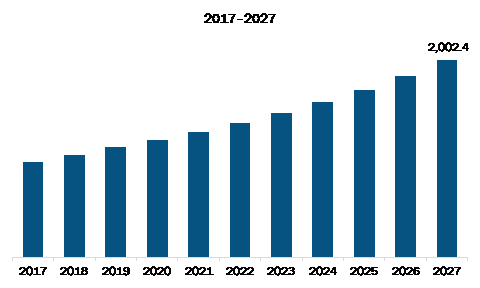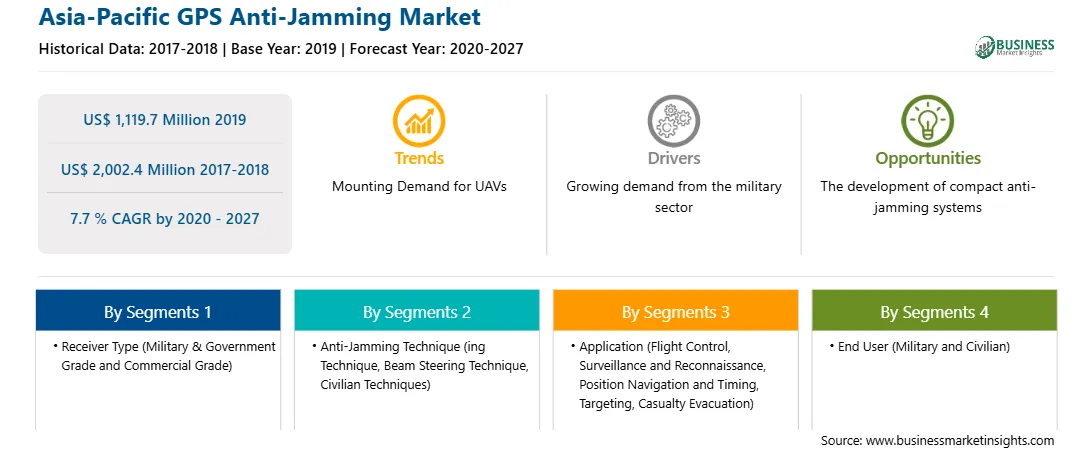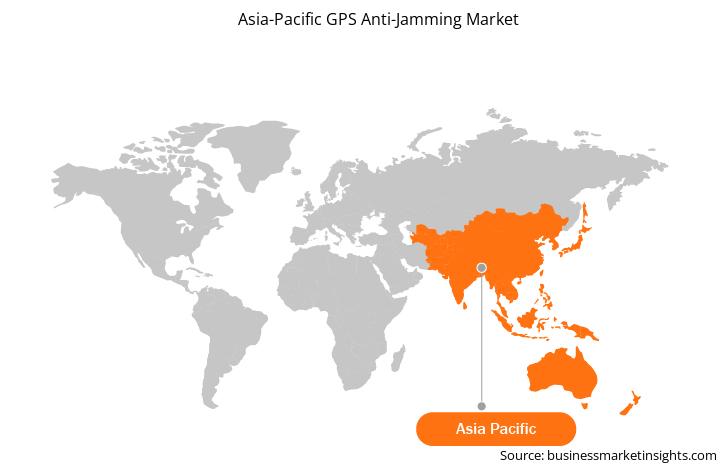The GPS (Global Positioning System) is a monitoring station and satellite network that distributes a signal used for positioning, timing, and navigation operations. The signal is free, reliable, and extremely accurate. By the time the GPS signal reaches the Earth's surface, it is weak and likely to be overcome by higher power radio frequency (RF) energy. An unprotected C/A Code receiver can be interrupted by even a small jammer of ~10 watts of power for ~30 km. GPS anti-jamming protects GPS receivers from malicious, intentional jamming and interference activities. The GPS anti-jamming process uses power minimization to reduce the interference and jamming effect to allow the GPS receiver's proper functioning. Growing adoption of GPS anti-jamming solutions from different sectors such as commercial drives the APAC GPS anti-jamming market growth. The growing demand for GPS anti-jamming from the growing automotive industry in India is also contributing to market growth. Further, rising expenditure on the military and defense industry in India and China has also accelerated the demand for GPS anti-jamming solutions in APAC. Other factors such as progressive developments to improve the overall GPS infrastructure and surge in demand for unmanned airborne vehicles and systems are also anticipated to drive the APAC GPS Anti-Jamming Market.
Furthermore, in case of COVID-19, APAC is highly affected specially the China and India. APAC region is one of the crucial regions for the future growth of GPS anti-jamming market, owing to the presence of a large number of developing countries, positive economic outlook, high industrial presence, and favorable government policies. The high growth rate of urbanization and industrialization in developing countries of APAC region is anticipated to offer ample growth opportunities to the market players operating in the GPS anti-jamming market, as the investments in both military and civilian infrastructure development is quite high in the region. However, the ongoing COVID-19 outbreak is causing huge disruptions in the growth of various sectors of APAC region. The lockdown of various plants and factories in China is affecting the global supply chains and negatively impacting manufacturing, delivery schedules, consumption, and sales of various products and services in the region. Due to COVID-19 outbreak, the industrial activities and new projects have seen a sharp decline with multiple projects on hold and unavailability of labor due to movement restrictions in various countries. Hence, the ongoing disruptions in supply of raw materials & components and also in demand from China & other countries is expected to impact the growth of GPS anti-jamming market in coming quarters.

Strategic insights for the Asia-Pacific GPS Anti-Jamming provides data-driven analysis of the industry landscape, including current trends, key players, and regional nuances. These insights offer actionable recommendations, enabling readers to differentiate themselves from competitors by identifying untapped segments or developing unique value propositions. Leveraging data analytics, these insights help industry players anticipate the market shifts, whether investors, manufacturers, or other stakeholders. A future-oriented perspective is essential, helping stakeholders anticipate market shifts and position themselves for long-term success in this dynamic region. Ultimately, effective strategic insights empower readers to make informed decisions that drive profitability and achieve their business objectives within the market.

| Report Attribute | Details |
|---|---|
| Market size in 2019 | US$ 1,119.7 Million |
| Market Size by 2027 | US$ 2,002.4 Million |
| Global CAGR (2020 - 2027) | 7.7 % |
| Historical Data | 2017-2018 |
| Forecast period | 2020-2027 |
| Segments Covered |
By Receiver Type
|
| Regions and Countries Covered | Asia-Pacific
|
| Market leaders and key company profiles |
The geographic scope of the Asia-Pacific GPS Anti-Jamming refers to the specific areas in which a business operates and competes. Understanding local distinctions, such as diverse consumer preferences (e.g., demand for specific plug types or battery backup durations), varying economic conditions, and regulatory environments, is crucial for tailoring strategies to specific markets. Businesses can expand their reach by identifying underserved areas or adapting their offerings to meet local demands. A clear market focus allows for more effective resource allocation, targeted marketing campaigns, and better positioning against local competitors, ultimately driving growth in those targeted areas.

The APAC GPS anti-jamming market is expected to grow from US$ 1,119.7 million in 2019 to US$ 2,002.4 million by 2027; it is estimated to grow at a CAGR of 7.7 % from 2020 to 2027. Increase in demand for GPS (Global Positioning System) technology in military applications is expected to accelerate the APAC GPS anti-jamming market. The GPS technology has revolutionized modern warfare. Military organizations rely on this technology for accurate positioning, and communications. The GPS was initially developed with a prime focus on addressing military needs. Military GPS / Global Navigation Satellite System (GNSS) devices are now highly used in air, land, and sea navigation applications pertaining to logistical support, force deployment, and vehicle navigation; these applications precisely include conducting search and rescue operations, cartography and survey, aerial refueling, and precision guidance. Signal jamming is a major limitation faced by GPS-based military operations. GPS jamming devices transmit signals in the same frequency as satellite navigation, resulting in the transmission of erroneous information about the location; jamming may also lead to the disruption of satellite transmissions. A few military applications such as the GPS Jammer Location (JLOC) were designed to monitor GPS interference and provide threat detection alerts to military personnel deployed in the field. Increase in demand of GPS technology in military sector will escalate the demand of GPS anti-jamming systems to avoid signal jamming, which will drive the APAC GPS anti-jamming market.
In terms of receiver type, the military & government grade segment accounted for the largest share of the APAC GPS anti-jamming market in 2019. In terms of anti-jamming technique, the nulling technique segment held a larger market share of the APAC GPS anti-jamming market in 2019. Similarly, in terms of application, the surveillance and reconnaissance segment held a larger market share of the APAC GPS anti-jamming market in 2019. Further, the military segment held a larger share of the APAC GPS anti-jamming market based on end user in 2019.
A few major primary and secondary sources referred to for preparing this report on the APAC GPS anti-jamming market are company websites, annual reports, financial reports, national government documents, and statistical database, among others. Major companies listed in the report are BAE SYSTEMS PLC; Cobham Limited; FURUNO ELECTRIC CO., LTD; infiniDome Ltd.; L3HARRIS Technologies, Inc.; Lockheed Martin Corporation; NovAtel Inc.; Raytheon Technologies; Thales Group.
The Asia-Pacific GPS Anti-Jamming Market is valued at US$ 1,119.7 Million in 2019, it is projected to reach US$ 2,002.4 Million by 2027.
As per our report Asia-Pacific GPS Anti-Jamming Market, the market size is valued at US$ 1,119.7 Million in 2019, projecting it to reach US$ 2,002.4 Million by 2027. This translates to a CAGR of approximately 7.7 % during the forecast period.
The Asia-Pacific GPS Anti-Jamming Market report typically cover these key segments-
The historic period, base year, and forecast period can vary slightly depending on the specific market research report. However, for the Asia-Pacific GPS Anti-Jamming Market report:
The Asia-Pacific GPS Anti-Jamming Market is populated by several key players, each contributing to its growth and innovation. Some of the major players include:
The Asia-Pacific GPS Anti-Jamming Market report is valuable for diverse stakeholders, including:
Essentially, anyone involved in or considering involvement in the Asia-Pacific GPS Anti-Jamming Market value chain can benefit from the information contained in a comprehensive market report.